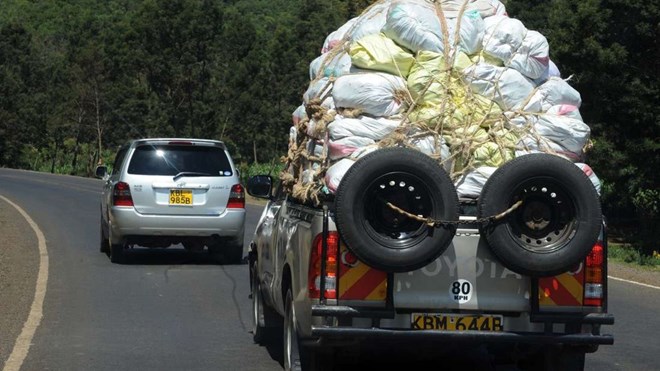
Source: Daily Nation, Kenya, Tuesday August 11, 2020

A pickup van transporting miraa. File | Nation Media Group
Miraa farmers and sellers are staring at a bleak future in the key Somalia market if the Kenyan government does not move with speed to resolve a trade impasse with its neighbour.
The hope of resumption of the trade in the biggest market crashed after Somalia exempted miraa from cargo allowed into the country after international flights resumed on August 3.
Their hope was further dimmed after a delegation of traders and transporters dispatched to engage the Somali government last failed to unlock the impasse after officials demanded government-to-government talks.
The trade in Somalia is also facing headwinds from anti-miraa crusaders who have taken advantage of the suspension induced by Covid-19 to intensify their campaign for a permanent ban.Goods from Somalia
Traders who spoke to the Nation said their delegation was informed that the continued suspension of miraa was due to Kenya’s stance on goods from Somalia, coupled by Kenya Airways’ failure to resume flights to Mogadishu.
According to Maua town miraa traders’ chairman Mohamed Qureshi, their delegation met government ministers and were upbeat they would resume business this week.
“However, President Mohamed Farmaajo rejected our request to lift the suspension of miraa trade. We are aware that the decision is not because of Covid-19 but due to Kenya’s recent hard stance on imports from Somalia.”
“Recently, a lot of rice, sugar and fish from Somalia has been destroyed by Kenyan officials,” Mr Qureshi said.
Alternative businesses
He said traders who have been relying on the Somalia market are now considering venturing into alternative businesses to earn a living.
“Since miraa was suspended in Somalia four months ago, some traders in Maua town are relying on well-wishers to survive. The situation is dire. The government should do something before we lose the only surviving market,” he pleaded.
Nyambene Miraa Traders Association (Nyamita) Chairman Kimathi Munjuri accused the government of ignoring their pleas to intervene in Somalia, leading to loss of livelihoods.
He confirmed that their last-ditch effort of sending a delegation of traders to Somalia has not borne fruit.
Talks with Somalia
“We reached out to the government way back in April to initiate talks with Somalia about the resumption of miraa trade. We were told that due to the inter-ministerial nature of the issue, it would be discussed in the Cabinet and a way forward given. We are shocked that nothing was done until Somalia extended the suspension of miraa business,” Mr Munjuri stated.
He said there was hope for resumption of trade this week after the Finance ministry released guidelines for miraa traders but the President rejected the proposal on Friday.
Nyambene Miraa Sacco Chairman Moses Lichoro said farmers will soon take to the streets to protest over the government’s silence.
“Farmers who grow the varieties meant for the Somalia market have lost millions of shillings in the last four months. We will be holding demonstrations until the government listens to us,” Mr Lichoro said.
Anti-miraa crusaders
The Covid-19 pandemic has become a blessing in disguise for anti-miraa campaigners who are now hoping the suspension is not lifted.
“Before Covid-19 came, there were attempts by the government in Somalia to start rehabilitating khat chewers and help traders venture into alternative businesses to prepare ground for a ban,” Mr Qureshi said.
Traders have been using road and the sea to deliver about two trucks of miraa which has turned out to be expensive.
A trader said it costs about Sh1.5 million to deliver miraa cargo by boat to Mogadishu, a journey that takes 11 days.
According to data from the Ministry of Finance in Somalia, miraa was the third largest local revenue earner for the country in 2019 at USD16.6 million (Sh1.79 billion) in import tax.
By May this year, the country had earned USD4.82 million (Sh521 million) from miraa imports.

